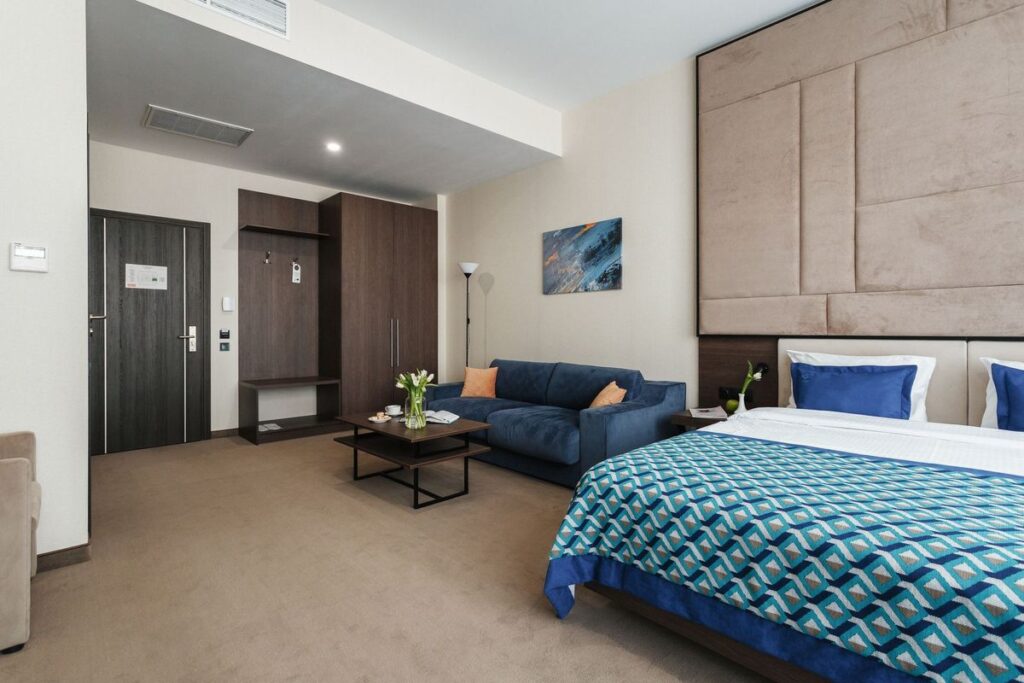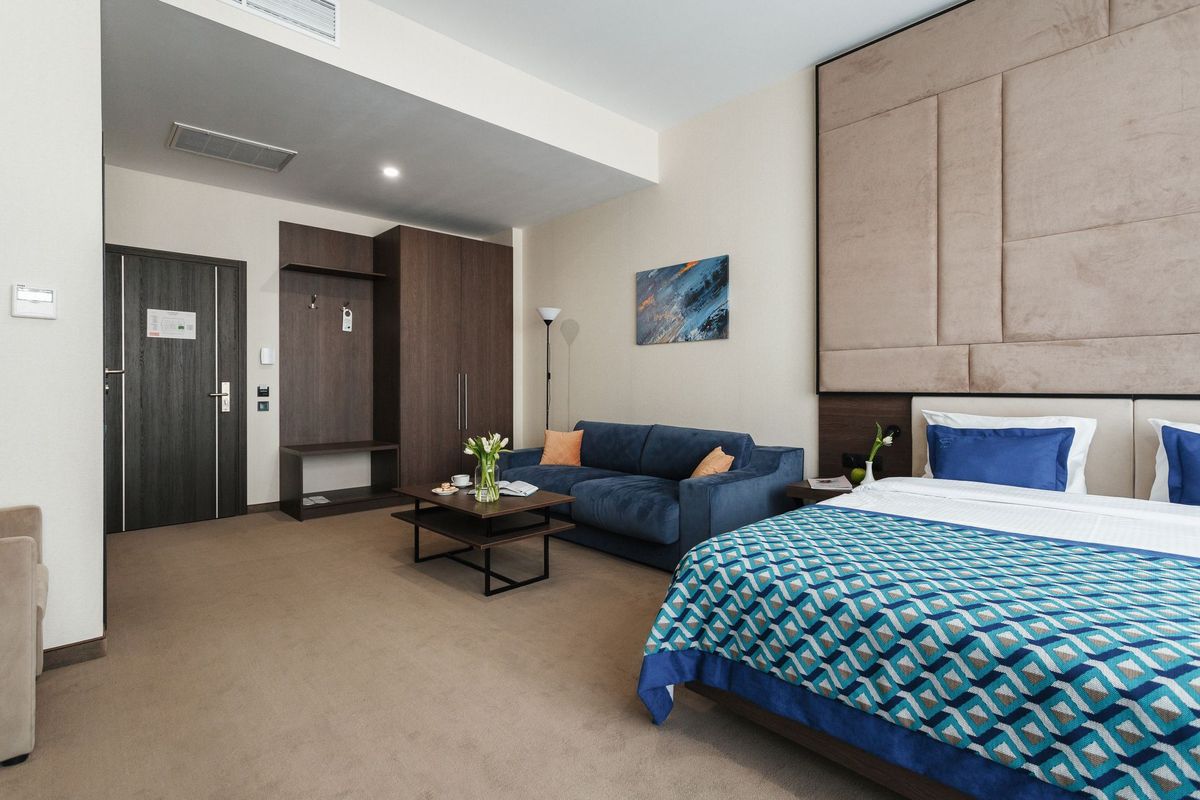On March 1, 2020, the Bossfor hotel received the Hospitality Awards International. It became a sort of final highlight in the year-end report of the collaboration with the management company Ribas Hotels Group. Exactly one year ago, on March 1, 2019, the contract was signed, granting Ribas Hotels Group the management of the three-star hotel.
— Before signing the contract, we closely inspected the property, analyzed the processes. In short, we conducted a preliminary audit, — says Andrey Marenychuk, the Executive Director of Ribas Hotels Group. The work on adaptation and optimization began right after the signing procedure on March 1, 2019.
How it all started
Each hotel has its own story of success, setbacks, and goal achievements. Odessa’s Business Hotel BOSSFOR had a solid foundation for a successful start based on several objective indicators. Before opening the hotel, the owner, Alexander Kucherenco, visited several educational platforms for hoteliers, gaining not only valuable information but also contacts with contractors and industry leaders in the HoReCa sphere. This approach to business was the right one.
However, over time, the owner came to the realization that many aspects of his hotel project remained uncertain.

Namely:
The payback period of investments.
The financial plan for the year, considering the phased staffing depending on seasonality.
Analysis of the performance in previous quarters, half-years, and years, along with a list of recommendations for the next year.
The overwhelming lack of time for other business ventures, as operational processes at the hotel occupied all working hours.
The hotel was functioning and generating a certain profit, but the owner lacked confidence in its future.
The story of one inquiry.
Most likely, this case will eventually become part of the list of HR department’s success stories of the management company when dealing with departing employees. The thing is, the owner of the Bossfor hotel was recommended the management company by the curator of the property, who had previously worked at Ribas Hotels Group as a corporate sales manager. It’s a case where a former employee brought a hotel property into the company’s portfolio. The owner met with representatives of the management company, and from the very first meeting, it became clear that both parties highly value the alignment of their visions – a shared understanding of how the company treats guests, employees, the property, and partners.
Motives.
There is a perception that management companies only take on unprofitable projects and properties with problems that owners cannot resolve on their own. However, the case of the Bossfor hotel shows that even seemingly successful properties also require management by professionals.
Hotel Bossfor is a stylish and upscale project with a satisfactory condition of its room inventory and high ratings on Booking.com, ranging from 9.4 to 9.6. At the time of handover to the management company, the staff was loyal to the company taking over management. The owner played a significant role in ensuring that the transition process was as smooth as possible for the employees and inconspicuous for the guests.
— I have worked with other management companies, — says the property owner. — During my discussion with the CEO, Arthur Lupashko, we went through the nuances of interacting with each department of the company. Arthur assured me that the management company takes full material responsibility. Such an approach is fundamental for a businessman when considering making a positive decision. I believe that I have, in a way, ‘freed up my hands.’ I can now dedicate my time to other activities while remaining completely confident in the well-being of this property.
First Steps
After conducting an audit of the hotel, the company’s specialists created the main financial document – the budget for 2019. They discovered one of the common challenges – most hotel managers in Ukraine lack the skills and knowledge to model the financial year for the hotel. As a result, they are unable to chart a direct path to the desired net profit figure.
— Most hotels are financially navigating like blind kittens, — noted the Executive Director of the management company, Andrey Marenychuk. — It was paradoxical for us that when this hotel was designed, no business model was created to guide its operations.
The owner of the hotel confirmed this idea.
— At the beginning of our communication regarding the property, I was given a document outlining how the hotel would operate. It became clear to me who would be responsible for what in this extensive management, control, and communication process. As the owner, I maintain an observer role. If something concerns me, I contact the respective department, and I receive feedback. However, I do not take on the role of directing the processes or acting as a manager.
Standards
When a hotel enters the active management phase or when the company takes on the creation and design of a property, the development department’s specialists conduct financial modeling with a focus on payback principles and timelines. They calculate the investment size for the hotel, provide recommendations on creating products for the hotel, and offer other suggestions to enhance the efficiency of operational processes.
Over the course of four years, the financial forecasts for the Bossfor hotel were uncertain, and the owner was unsure when their investments would be recouped. That is why the first document that was created for the owner of the hotel is the budget for the year.

This document included:
phased recruitment of staff, based on the load of the hotel;
staffing optimization;
changes in operational processes and explanations for them;
staff optimization by almost 40% and the rationale for these actions.
To achieve this, an analysis of data from several years is conducted:
Object history;
Sources of net profit;
Reasons for these particular sizes;
Through a combination of which decisions, we will achieve an increase in performance indicators.
The task of management is to increase revenue, optimize costs and scale the business. Operational management is based on this.
Mistakes of the current object:
The hotel had a team consisting of a marketer, corporate sales manager, chief accountant, accountant, manager, and deputy manager. There was also an in-house laundry facility. The owner finds it difficult to part ways with the individuals who held these positions, as he has known them since the hotel’s inception. This is a separate issue faced by properties, as emotions sometimes prevail over business efficiency in such cases. And, of course, this problem directly affects net profit and other performance indicators.
Actions and results
They showed statistics based on three years of the property’s operation: maintaining their own laundry facility was inefficient considering the size of the room inventory. With such volumes, it was more cost-effective to outsource this service rather than handling it in-house.
They conducted a thorough audit of the property and recommended positions that needed optimization.
Over the course of one year of coordinated operational management, the property managed to increase its net profit by 70%.
Made logistics short and cheap.
They improved service performance (according to data from Booking, Google, Facebook) by removing unnecessary items and thoroughly refining the duties of employees who frequently interact with guests.
Received a prestigious award – Hospitality Awards International – as the best three-star business hotel. There was a certain symbolism in this. The management company began active work with the object on March 1, 2019. The award was received on March 1, 2020.

